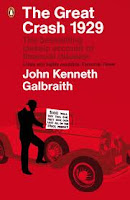The Great Crash 1929 is considered by many to the classic account of the 1929 stock market crash that sent the US and much of the world into deep economic depression. Written by JK Galbraith, one of the leading economic historians of the twentieth century, it is a surprisingly thin volume, split into ten chapters. Galbraith’s analysis very much focuses on the stock market, financiers and government in the immediate lead up to the crash, the crash itself and its aftermath with respect to Wall Street. How the crash played out in other locales or countries is barely touched upon. Nor is the Great Depression that follows, except in cursory terms. This is a pity, because it would have more explained the role of the great crash in the development and unfolding of the depression and crises domestically and around the globe and given a wider appreciation of the crash’s long-term, deep consequences. His analysis also relies heavily on reports, newspaper accounts and other secondary sources rather than primary research, such as interviewing key players. The overall effect is a narrowly focused, rather dry account of the crash. Nonetheless, the narrative does highlight that many of the factors that were important in the global financial collapse of 2008 replicated those of the Great Crash, and the crash itself unfolded in a similar fashion. Whilst many lessons were learnt and policy changes implemented post The Great Crash, over the past couple of decades those regulations and practices were systematically undone in the belief that history would not repeat itself. Unfortunately, there are sound reasons why strong financial regulation is a good idea as Galbraith’s book and recent history demonstrate.



2 comments:
They are expecting our US dollar to collapse in the next four years, Rob. Dark days ahead. I think our current government has orchestrated it and the majority of people play right into their hands. We have more people riding in the wagon than are pulling it and the government whipping those pulling telling them to pull harder. I don't comment often but I do enjoy your blog!
Peggy-Ann. Thanks for the comment. Global finance seems to be in a mess at the minute and governments don't really seem to know what to do. It doesn't help that they seem enslaved to the financiers. These things seem to go in cycles, but in my view the dominance of neoliberal thinking is not going help; proper regulation and governance will.
Post a Comment